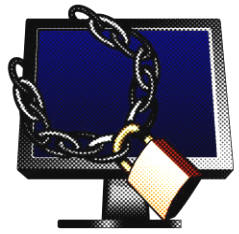If you’re company is still using Windows XP months after Microsoft stopped issuing security updates, your data is more at risk than ever. If you run any part of your business on your XP computer, you risk that information by not addressing this security issue. Don’t think that this is strictly a computer problem.
 Would losing your client list or accounting data cause you major headaches?
Would losing your client list or accounting data cause you major headaches?
According to Net Applications, about 25% of computers in use are still running Windows XP. This makes it the second most popular desktop operating system in the world. If your company still uses Windows XP, you have two options to secure your company’s data and keep your operations working.
The first option is the one recommended by Microsoft. Upgrade to a new computer with Windows 7 or 8 installed.
If you want to upgrade to a computer that looks and acts very much like XP, only better, the choice is Windows 7. Most users won’t notice much of a difference. It’s faster, and more secure than XP, and most XP software will run on it with an upgrade to the Windows 7 security version. Finding a Windows 7 computer can be difficult. Dell, HP, and Toshiba all still sell them, but you may not find them at local stores.
 Microsoft prefers that you go with Windows 8. It’s faster and more secure, and it has the tile menu system that most people seem to hate. Windows 8.1 has made improvements, but there is still no Start menu. This means that XP users may be confused about how to get some things done. You can easily find Windows 8 computers, and all will automatically upgrade to Windows 8.1.
Microsoft prefers that you go with Windows 8. It’s faster and more secure, and it has the tile menu system that most people seem to hate. Windows 8.1 has made improvements, but there is still no Start menu. This means that XP users may be confused about how to get some things done. You can easily find Windows 8 computers, and all will automatically upgrade to Windows 8.1.
Windows 9 is expected to be released in about a year. That’s a long time to wait while using a less and less secure XP computer. The upside of waiting is that Windows 9 is expected to look more like Windows 7 with the familiar desktop and some type of Start button/menu system.
What are my options if I don’t want to give up on XP yet?
If you won’t be changing software, the real issue is security. Over time, Windows XP will be much less secure than new versions. If your computer has any connection to the outside world through the Internet, a local network, or even removable drives like thumb drives, you must make changes to increase your security.
 Make sure that all of your installed software is up to date. Security updates, especially Adobe Acrobat and Java, MUST be installed as soon as they become available.
Make sure that all of your installed software is up to date. Security updates, especially Adobe Acrobat and Java, MUST be installed as soon as they become available.- Get a better antivirus. AVG and AVAST! offer good security for free. Paid packages offer superior protection, but can limit downloads and other activities on your computer. If something stops working after you install a new antivirus, read any error messages carefully to see if you have options to work around the problem.
- Switch to Chrome or Firefox browsers. They are both more up to date and secure than Internet Explorer on Windows XP.
- Disconnect from the Internet as much as possible. Do not use your XP computer to check Facebook or other non-essential business needs. Ideally, the only connection to the internet would be a brief check for software updates. If your computer is not on the Internet, it is much harder to attack.
By the way, all upgraded versions of NSPG software run on Windows 7 and 8, so when you do make the decision to upgrade, you can continue to run NSPG products.
